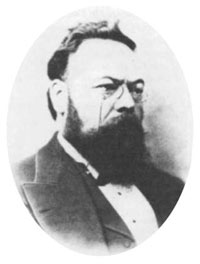James Compton Burnett: Unterschied zwischen den Versionen
| [gesichtete Version] | [gesichtete Version] |
| Zeile 1: | Zeile 1: | ||
| − | |||
| − | James Compton Burnett | + | [[File:James-compton-burnett.jpg|thumb|right|James Compton Burnett)]] |
| + | |||
| + | James Compton Burnett (1840–1901), englischer Arzt und Homöopath | ||
| + | |||
| + | |||
| + | James Compton Burnett was born on July 10, 1840 and died April 2, 1901. Dr. Burnett attended medical school in Vienna, Austria in 1865. Alfred Hawkes converted him to homeopathy in 1872 (in Glasgow). In 1876 he took his MD degree. | ||
| + | |||
| + | Burnett was one of the first to speak about vaccination triggering illness. This was discussed in his book, Vaccinosis, published in 1884. | ||
| + | |||
| + | Along with other nosodes, he introduced the remedy Baccillinum. A prodigious writer he published over twenty books in his lifetime. His book, Fifty Reasons for Being a Homoeopath (1888), is of particular note for beginning homeopaths. | ||
| + | |||
| + | [[J.H. Clarke]], Robert T. Cooper, and James Compton Burnett together formed the 'Cooper Club'. This regular meeting of leading British homeopaths was the source of many of the symptoms in Clarke's Dictionary of Materia Medica. | ||
| + | |||
| + | Clarke says of Burnett, "…during the last twenty years Burnett has been the most powerful, the most fruitful, and the most original force in homeopathy". | ||
Version vom 11. September 2018, 09:03 Uhr
James Compton Burnett (1840–1901), englischer Arzt und Homöopath
James Compton Burnett was born on July 10, 1840 and died April 2, 1901. Dr. Burnett attended medical school in Vienna, Austria in 1865. Alfred Hawkes converted him to homeopathy in 1872 (in Glasgow). In 1876 he took his MD degree.
Burnett was one of the first to speak about vaccination triggering illness. This was discussed in his book, Vaccinosis, published in 1884.
Along with other nosodes, he introduced the remedy Baccillinum. A prodigious writer he published over twenty books in his lifetime. His book, Fifty Reasons for Being a Homoeopath (1888), is of particular note for beginning homeopaths.
J.H. Clarke, Robert T. Cooper, and James Compton Burnett together formed the 'Cooper Club'. This regular meeting of leading British homeopaths was the source of many of the symptoms in Clarke's Dictionary of Materia Medica.
Clarke says of Burnett, "…during the last twenty years Burnett has been the most powerful, the most fruitful, and the most original force in homeopathy".
